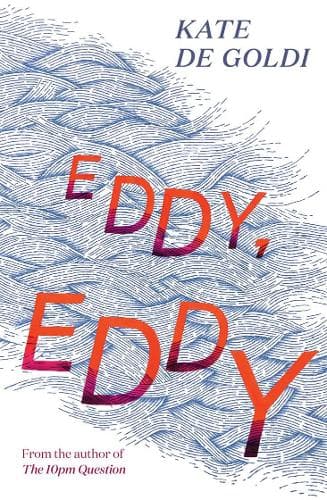Review: Eddy, Eddy
Reviewed by Jessie Neilson
Christchurch-raised writer and literary critic Kate De Goldi is known for her young adult fiction and picture books, short stories, and novels, including the celebrated young adult novel The 10pm Question. In her new novel, Eddy, Eddy, set in her hometown, De Goldi explores notions of family among the literal and psychological ruins, with a strong dose of religion spilt through, threatening everyday stability.
Though mostly told in third person, her picaresque protagonist's distinct outlook reigns. Eddy is equipped with the verbal tools of the trade of life and his sumptuous interpretations generously coat his anything-but-banal days.
The novel's framework is loosely based on Charles Dickens' A Christmas Carol. This is echoed not only in characters, relationship and events but also in themes of redemption, changes in fortune, self-awareness and movement towards joy.
Nineteen-year-old Eddy Smallbone is recently bereaved. His beloved Labrador, Marley, wrapped in her favourite Kaiapoi Pure Wool blanket, is being transported home from an orchestrated, necessitated demise at the vets. The hole has been dug on a September morning in the unusually warm and comatose city of recently post-quake Christchurch. Emotions are frayed.
Joining the ceremony is Eddy's uncle-father, Brain. Brain has brought up the orphaned young man and, fitting for a research librarian, he comes complete with "over-deliberate enunciation" and "ponderous cerebrations." Brain's vast vocabulary has trickled its way into Eddy's whole being, where adamantine, comestibles, demulcent and the suchlike make their erudite presence felt at random moments, despite the younger's best attempts at stonewalling.
Eddy and Brain share a house but these days it is without its "hustle and operatic whimpering." The streets now seemed riddled with lolloping Labradors. Eddy now has time and heart space to fill. The chance comes to pet-mind and before he knows what has confronted him, a swearing cockatoo with its "baroque crest performance," numerable spoodles, Golden Bell frogs and Schnauzers command his days.
Yet his duties do not stop at pets. Young Delphine, alternately earnest and truculent, regularly "mosquito-bombs" him with questions as he also child minds in his loosely defined new occupation. Though he has few friends, the odd ex-girlfriend reappears, as does his uncle's close-knit, assorted gaggle of misfits. One who regularly pops up through the course of their days, either in material or ethereal form, is the Modern Priest, formerly known as Chris Mangan. He represents to Eddy all that is hypocritical and repulsive about religion. Having been immersed in Catholic schooling, Eddy has firm thoughts about moralising. His inner criticism of religion and his general irritations are strong currents pushing through the novel.
Eddy is whimsical and well-meaning, and his personality, imagination, and wordplay (if ostensibly reluctantly inherited), set the tone of the book. Even as he is grieving, his light-hearted bubbliness bursts through where he is content to be "dog-adjacent" but not fully involved. He observes the wreckage of post-earthquake terrain, trying to be cheery. The cathedral is a "still life of vomited stone.” He accepts that his life has "splayed sideways like a spasming limb.”
Characters, though modern, are also appealingly Victorian. Beneath Brain's raccoon eyebrows is a Gilbert and Sullivan devotee, a deputy choirmaster with a baritone range. Like a schoolteacher, life is full of teaching moments and Eddy has been "Brain-washed,” structuring meticulously, scrolling through his mental timetable.
The story makes its way towards December and Christmas celebrations, following Dickens. The prose becomes ever baroque, complex and decorative words filling the scenes. Characters burgeon, real or phantasmagorical; jesting dialogues and debates ensue. One line stands out as a fitting sentiment for such a rollicking and thrilling readerly escapade: "Minor to major! The unquenchable human inclination to the joyous!"
Reviewed by Jessie Neilson
